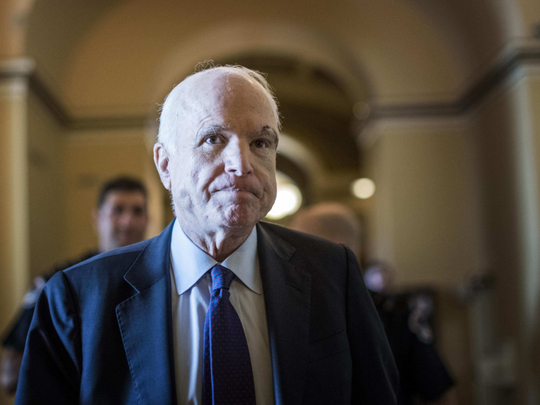
I’m a journalist. I’ve spent my career criticising politicians. I have always seen that as my job.
Yet, I now find myself in the unaccustomed position of singing the praises of one of them — the remarkable Senator John McCain (Republican, from Arizona). When we learned last week that he was afflicted with brain cancer, the news not only jolted Washington’s political scene, but also sent a shock wave through the community of human rights defenders around the globe. It’s important to appreciate just how unusual this is. These two worlds — the politicians and the activists — almost never agree on anything. Yet, McCain enjoys immense respect in both of them.
That should help to explain why his medical diagnosis was top news not only in the United States, but also across Europe, the Middle East and Asia. Since the news of his illness broke, my phone hasn’t stopped ringing. Journalist and activist friends — from Afghanistan and Ukraine, from Egypt and Turkey — have been calling in shock and dismay, refusing to accept the news.
The first time I met McCain was at a meeting in Brussels during the George W. Bush administration. At the time, the European Union (EU) was outraged by the CIA’s clandestine flights and torture policies. McCain’s clear and resolute stance against torture came as a huge relief to the United States’ allies in Europe. “The world would be a safer place if Senator McCain was the US president,” one Dutch diplomat told me.
I next met the senator several years later, in a Syrian refugee camp in Turkey. By then, I had been to many camps and covered several high-level meetings. In striking contrast to other high-level visitors, McCain spent most of his time actually talking with the Syrians who had been forced to flee their war-torn homeland. It was refreshing to see a politician who didn’t care about photo ops and who paid more attention to the refugees themselves than to the official statement from the camp authorities. I wasn’t the only one impressed by the senator’s visit. One Syrian who attended the meeting with McCain told me: “He was the only visiting politician to give us more than lip service.”
I haven’t always agreed with all of McCain’s policies, but from the minute I met him, I have had the utmost respect for his bravery and his loyalty to what he believes in. He’s a man who has always stuck to his values even when they aren’t popular.
While many politicians remember human rights and democracy only when it’s convenient, the senator has consistently championed human rights, democracy and the rule of law. He has been one of Washington’s most consistent defenders of the late Chinese Nobel laureate Liu Xiaobo, a man many US politicians have been reluctant to praise for fear of offending China. He called for the closure of the US detention Centre in Guantanamo Bay when this wasn’t exactly calculated to make him friends in his own party.
Unique opportunity
Disclosure: Three years ago, I was fortunate enough to come to the US as one of the fellows of the Next Generation Leaders programme at the McCain Institute in Washington. The institute, created by McCain and his family, is a testament to the senator’s life-long devotion to human rights. Over the past five years, the institute has created a network of 44 emerging leaders from 33 countries and five continents, who are committed to good governance, leadership and human rights. Every year, the institute gives human rights defenders a unique opportunity to gather in Arizona, where they speak about their fight against tyranny and their desire to make the world a better place.
By doing this, McCain hasn’t just given human rights defenders a chance to make their case to people in the US. He has also given them an opportunity to share lessons and expertise with one another, creating a worldwide community of people working for positive change. “Apparently, some Americans don’t know Senator McCain as well as we do,” one Ukrainian activist told me when he heard the news about the senator’s illness. “He’ll never back down from a fight because the odds aren’t in his favour.”
McCain has been a guardian angel for many activists who have been fighting for their freedoms despite the odds. That might help Americans understand why they aren’t the only ones who are now appreciating his legacy afresh. From Syria to Russia, from Myanmar to Ukraine, those who truly believe in freedom are praying for a speedy recovery of their true friend in the US.
— Washington Post
Berivan Orucoglu is a writer and the programme coordinator for Supporting Human Rights Defenders programme.









